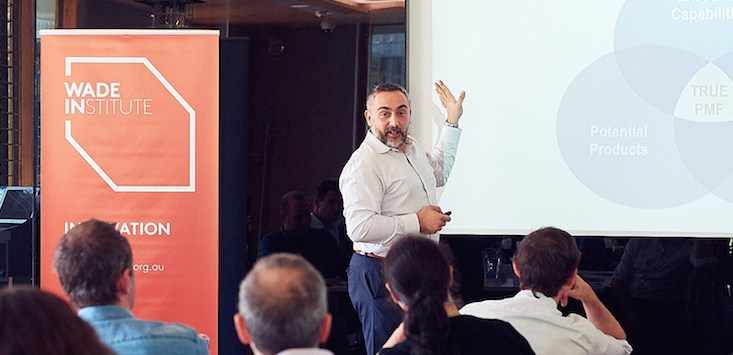
Source: Wade Institute.
Australia’s startup ecosystem has plenty of talented venture capital investors, but needs many more to back the next generation of home-grown unicorns.
So how do we foster them?
Recoveries following economic downturns are historically the periods in which the kind of companies that venture capital backs – emerging technologies with transformative vision – do particularly well. The economic impact of COVID-19 has created a fertile environment for talented Australian technology founders. But development on the startup side of the equation must be followed by a comparable development among venture capital investors, or Australia’s innovative potential risks being captured by offshore funds.
There is no formal training for venture capital investors; it’s a very “learn by doing” industry, and this apprenticeship model has a very steep learning curve, even for people who are already sophisticated investors. But for successful venture capital investors the rewards are immense.
For all of its peculiarities, venture capital definitely is an asset class – technically a subset of private equity. But it’s one of very few asset classes that has a non-linear return structure. It might take a century or more for a real estate investor to generate a 100x return on their investment, but the most successful venture capital investments can generate in excess of those returns in only a few years.
Of course there is a risk-reward balance, and few investments will turn $12 million into billions in nine years the way Accel Partners did with its 2005 stake in Facebook. And when venture capital investments do go bad, there is no residual value, as there would be with real estate or share market investments where you’re effectively playing the outside while the bulk of your principal is relatively safe.
This is why even some sophisticated investors view venture capital as something of a lottery. But this is not accurate. People who play the lottery can’t affect the outcome once they have bought their ticket, but venture capital investors can, and must, if they are going to be successful.
Lottery winners tend not to win quarter after quarter and year after year, but the top venture investors and partners outperform consistently. This is another peculiarity of venture capital as an asset class — it does not regress to a mean the way, for instance, mutual funds do. Overperformers consistently overperform because they are doing things well.
Most large investors — pension funds, endowments and limited partnerships — do not over-index into venture capital, choosing to maintain between two and fifteen per cent of their portfolio in the asset class. Partially this is because of the lack of principal protection, and it’s partially because that two to fifteen per cent of their holdings take up far more time and energy than their weighting would suggest.
Why venture capital is different
Venture capital is active. Investors do not simply contribute their money and hope for the best. They bring their skills, their resume, their networks and their expertise to the company that they invest in and they contribute those to the success of that company. This is another serious point of difference from most asset classes.
If I’m borrowing to invest in real estate, I go to a bank and while I’d prefer the bankers smile at me and offer me a glass of water, all I really care about are the rate and loan terms they will offer.
If I am seeking investment for the coffee shop I’m opening, the commercial lender I approach for capital is going to consider the fundamentals of my business, but they’re not going to provide advice on roasting profiles and help me make connections to coffee farmers in Ethiopia.
In venture capital, having money isn’t enough. You need to have smart money. And everyone — from company founders to fellow investors — cares more about the amount of smarts you have than the amount of money you’re putting down.
Now that Australia has piqued the interest of the global venture investment community by producing companies like Altlassian, Canva and Culture Amp, local investors are competing against money from Silicon Valley, New York and Singapore.
There are many natural advantages Australian investors have over their more experienced offshore counterparts, and it goes beyond time zone alignment.
There are courses available in Australia that aim to mobilise investors to make the leap into VC by helping them gain best practice tools and skills.
Furthermore, one of the most valuable qualities an investor can bring to a startup is domain expertise, and domain expertise is somewhat market-specific, especially in areas that are heavily influenced by government policy like health and education – two sectors Australian startups are particularly strong in.
It is best practice for most startups to conquer their own backyard before looking to scale to other markets and this presents another advantage. Early-stage investors who have a good understanding of local business conditions and culture will be more suitable than outsiders, and it’s these early stage investments that offer the most outsized returns for the top tier of startups.
It’s all but inevitable that the Australian startup ecosystem will mature to the point where a network of successful investors builds one unicorn after another. The only questions that remain are who they will be, and how many of those investors will be local.
Handpicked for you

Brighte bags $100 million to “go deeper” on energytech, but founder Katherine McConnell is keeping a startup mindset



COMMENTS
SmartCompany is committed to hosting lively discussions. Help us keep the conversation useful, interesting and welcoming. We aim to publish comments quickly in the interest of promoting robust conversation, but we’re a small team and we deploy filters to protect against legal risk. Occasionally your comment may be held up while it is being reviewed, but we’re working as fast as we can to keep the conversation rolling.
The SmartCompany comment section is members-only content. Please subscribe to leave a comment.
The SmartCompany comment section is members-only content. Please login to leave a comment.